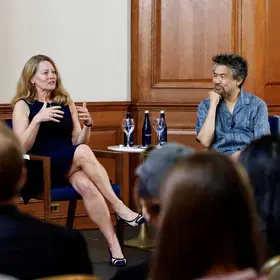By Iza Martinez
In today's fast-paced business world, sustainability is more than just a trendy buzzword; it's an integral part of informed decision-making. As companies increasingly prioritize integrating sustainability into their operations, the need for knowledgeable leaders in this field is higher than ever.
In response to these constantly evolving market demands, the M.S. in Sustainability Management (SUMA) program continues to update its curriculum to include topics that equip graduates for a contemporary business landscape. Angela Jhanji brings her extensive expertise to the forefront of meeting this demand with her new class, “Sustainability Value Creation in Private Markets.” In this interview, she outlines her goals for the students of this class and what they can expect to gain from this experience.
What motivated the development of this class? Why is it especially relevant now?
Market demand was the key driver for this course. I have watched private markets grow and develop in sophistication in the U.S. and Europe over the past couple of years. It's not enough to look at red flags during outside-in diligence. Instead, when you think about sustainability topics in terms of investment, tools are being developed for positive and negative screens and maturity models to assess the sophistication of a management team's agenda. Underwriting is starting to sneak onto the scene regarding decarbonization, climate risk, and biodiversity, and insurers are beginning to ask questions about sector-specific risks to value creation. This is all to say that private markets are not only taking sustainability more seriously, but they have opened a large sandbox to explore the art of the possible in terms of sustainability-related returns.
What if we were to bolster compliance and downside protection and measure value creation through focused efforts around growth, product strategy, and supply chain optimization linked to material sustainability topics like decarbonization? These are the questions G.P.s (general partners) are thinking through, where sustainability is a core part of the value creation thesis.
What are some of the critical skills and tools students will learn in your course?
The course covers the perspective of a sustainability professional working across the investment lifecycle and how to map sustainability during each stage. We start with what sustainability means in private markets and the forces that create the demand for greater sophistication. We then discuss sourcing deals and the Leveraged Buyout "LBO" model—and how sustainability considerations differ between asset classes, ownership structures, and what the crux of having "control" really means. We move to risks, value creation, and quantifying sustainability in the exit story for the next investor or at exit through an initial public offering, or "IPO."
Every class has a mixture of academic theory and practical challenges brought to life in the form of case studies, expert guests, and perspectives from those within the G.P.s. For example, how do you prioritize sustainability value creation if you have a distressed asset in a difficult financial condition? How do you structure evaluating value creation opportunities by thinking about them through the lens of the income statement and balance sheet? How do sector (asset heavy vs. light) and geographic (U.S., APAC vs. E.U.) nuances inform your approach?
Working in sustainability value creation means one must be problem-solving on a minute-by-minute basis—and this course mimics the complexity faced in-house. We culminate a deal due diligence simulation presented to an investment committee, allowing students to showcase and defend their insights in real-time.
How does this practical component prepare students for integrating real-world sustainability into investment strategies?
I am a big advocate of structured problem-solving. It helps you examine the details and understand the nuances and pressure points. But you must always be able to explain the top line to whomever you are speaking with. Without this skill, the hours and weeks of work may just go to waste.
Real-world sustainability in private markets is about understanding your stakeholders—meaning deal teams, investment committees, and management teams at portfolio companies. The narratives and focus are similar but different for each. Structured problem-solving and practical examples enable future professionals to start to speak the language of these key stakeholders. Without this skill, sustainability value creation will be impossible on a day-to-day basis.
An investment committee environment is one where the stakes are high. While you may just have spent two weeks of sleepless nights ideating, analyzing, and growing conviction in multiple sustainability hypotheses, you must quickly synthesize your perspective when the topic turns to you. The ultimate test is being selective and offering the interjection that matters to investment most. Each student will have the tools to think through sustainability from a downside and upside perspective, and we will have covered several sectors and role-modeled case studies.
How do you envision students will create value in private markets after completing this class?
Sustainability skills and experience are required across the stakeholder landscape in private markets, whether that is through an operator profile like me or through the ecosystem that exists to support the G.P. Vendors, consultants, lawyers, research think tanks, multilaterals, and more continue to see an increased demand. So, an understanding specific to private markets investing will be essential.
Whether students go into a direct value creation role or industry roles without sustainability, my hope is that their learnings will help them become advocates who can talk about sustainability in tangible terms. Our students are our future, and they are the changemakers who will become tomorrow's leaders in public, private, and not-for-profit sectors. Having a stance on sustainability creates resilient businesses, generates returns, and has positive impacts on the very real challenges we will face; the more of them who know this, the better.
About the Program
The Master of Science in Sustainability Management program, offered by the School of Professional Studies in partnership with the Climate School, is designed for current and aspiring leaders who wish to pursue a career in management at the intersection of business and the environment.


